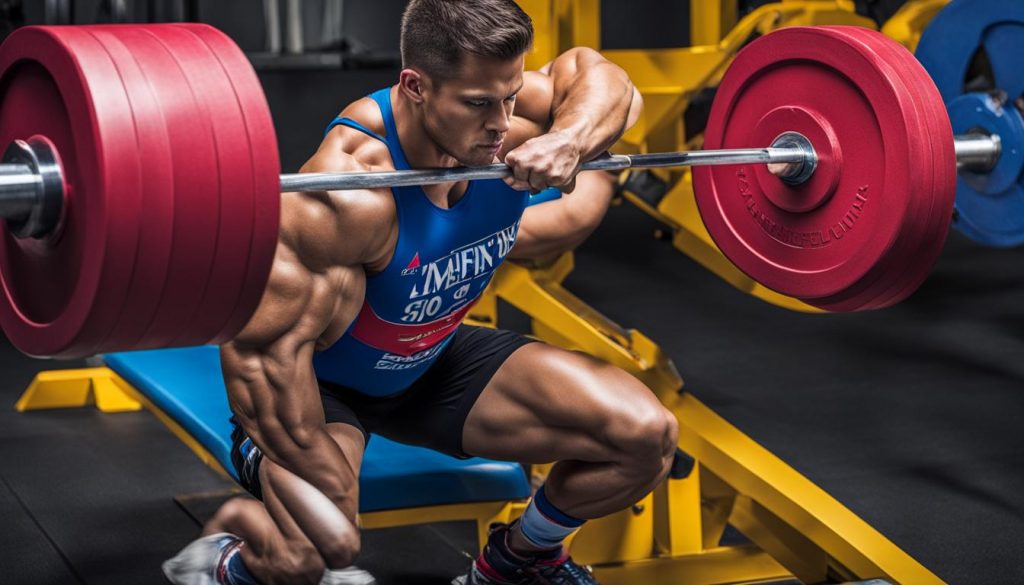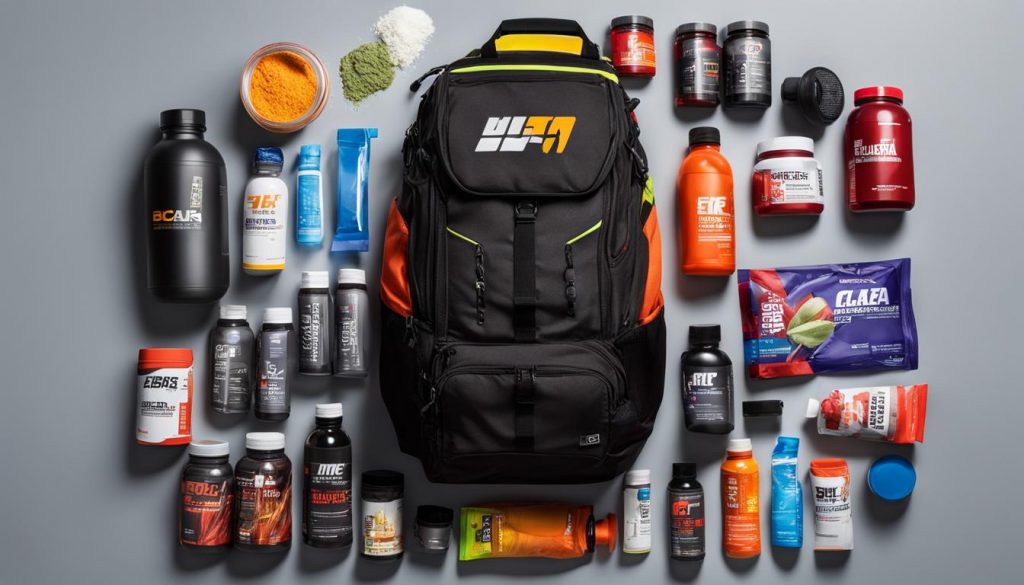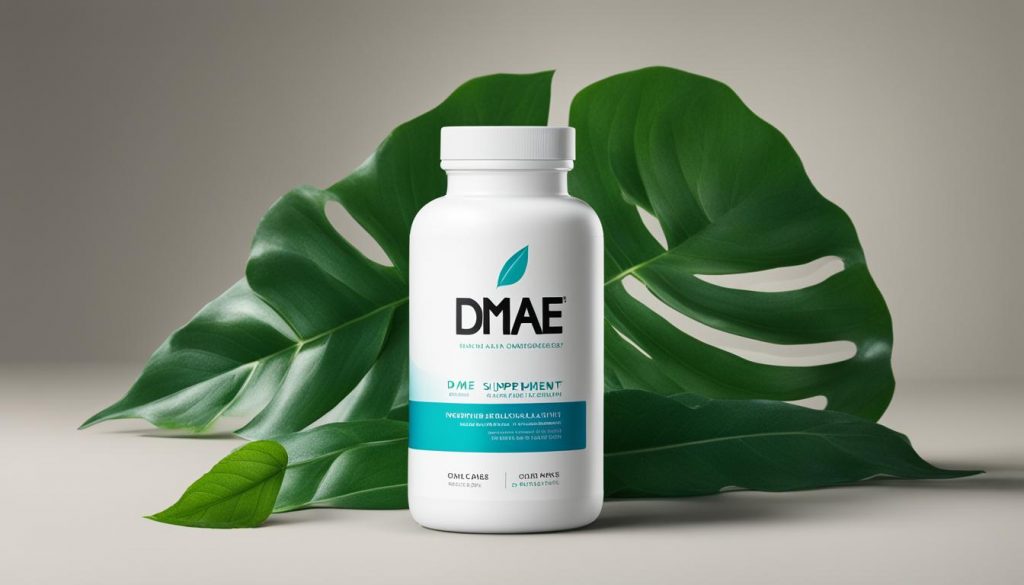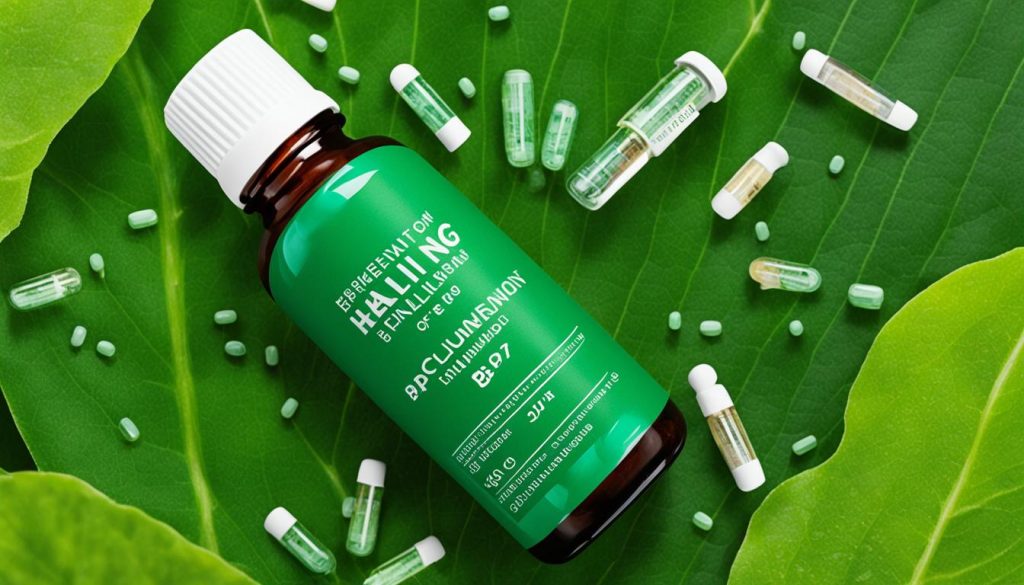If you’re a powerlifter aiming to boost your strength, power and overall performance, supplementing your nutrition might be beneficial. A properly balanced diet is undeniably essential, however, additional supplements can offer the extra boost needed to augment performance and speed up recovery. This article offers insight into the most beneficial supplements for powerlifters, drawn from expert opinions and scientific studies.
Key Takeaways:
- Choosing the right supplements can enhance powerlifting performance.
- Supplements should be used in conjunction with a balanced diet and training program.
- Consider factors such as powerlifting organization regulations and reputable supplement companies before incorporating supplements.
- Creatine, glutamine, fish oil, glucosamine, chondroitin, calcium, micronutrients, HMB, caffeine, and vitamin D are some commonly used supplements for powerlifters.
- Individual responses to supplements may vary, so it’s important to consult with a healthcare professional or coach for personalized guidance.
The Importance of Supplements in Powerlifting
In the world of powerlifting, proper nutrition is essential for optimal performance. While a well-balanced diet should always be the foundation, powerlifters can benefit from incorporating supplements into their nutrition regimen. Supplements play a vital role in powerlifting by providing additional nutrients and support that may be lacking in a regular diet. They can fill in the gaps and give powerlifters the extra edge they need to enhance their strength, power, and overall performance.
Supplements for strength and powerlifting are not meant to replace a healthy diet or training program, but rather to complement them. They are designed to enhance and support the body’s natural processes, helping powerlifters to achieve their goals more effectively. By providing essential nutrients, such as proteins, amino acids, vitamins, and minerals, supplements can optimize muscle recovery, reduce inflammation, promote energy production, and support overall health.
Powerlifting places significant demands on the body, and powerlifters often engage in intense training sessions that can result in muscle breakdown, fatigue, and delayed recovery. Supplements can help address these challenges by providing targeted nutrition to aid in muscle repair, reduce muscle soreness, and enhance recovery. They can also support the immune system, promote joint health, and improve overall well-being.
“Supplements are not a magic bullet, but they can provide the extra fuel and support needed to take your powerlifting performance to the next level.”
It is important to note that not all supplements are created equal, and it is crucial to choose high-quality products from reputable brands. Before incorporating any supplements into your routine, it is recommended to consult with a healthcare professional or a registered dietitian specializing in sports nutrition. They can provide personalized recommendations based on your specific needs, goals, and any dietary restrictions or considerations you may have.
In the upcoming sections, we will explore some of the must-have supplements for powerlifters and delve into their benefits, dosages, and potential side effects. From creatine, glutamine, and fish oil to glucosamine, chondroitin, and micronutrients, we will cover a range of supplements that can contribute to your powerlifting success. Let’s dive in and discover how these supplements can optimize your performance and help you reach new heights in your powerlifting journey.
Why are supplements important in powerlifting?
In powerlifting, rigorous training routines and intense physical exertion require proper nutrition to support muscle growth, recovery, and overall performance. While a well-balanced diet forms the foundation, powerlifting supplements provide additional support by filling in nutritional gaps and enhancing muscle repair, recovery, and strength development. They can optimize training adaptations, improve performance, and contribute to long-term powerlifting success.
Factors to Consider Before Taking Supplements
Before incorporating any supplement into your routine, there are a few factors to consider:
- Check if the supplement is allowed by your powerlifting organization: Different powerlifting organizations may have different banned substance lists. It is important to ensure that the supplement you plan to take is not prohibited by your organization.
- Research and choose reputable supplement companies: Not all supplement companies are created equal. It is crucial to do your due diligence and select a reputable company that prioritizes quality and safety. Look for companies that undergo third-party testing to ensure the purity and potency of their products.
- Be aware of banned substances in powerlifting: In addition to checking your organization’s specific banned substance list, it is important to educate yourself on commonly banned substances in powerlifting. This knowledge will help you make informed decisions when choosing supplements and avoid any potential issues.
By considering these factors, you can ensure that you are making wise choices when it comes to selecting powerlifting supplements. This will help you optimize your performance and avoid any unwanted consequences.
Expert Tip:
“When it comes to supplements, it’s vital to do your research and make informed decisions. Check for third-party certifications, like NSF or Informed Sport, as they can provide additional assurance of a supplement’s quality and safety.”
Creatine – The King of Powerlifting Supplements
Creatine is widely recognized as one of the best supplements for powerlifting. It is a naturally occurring substance in the body and can also be found in red meat. When taken as a supplement, creatine provides extra creatine phosphate for the muscles, which increases energy production and enhances performance during intense training sessions.
The most common form of creatine is creatine monohydrate, which has been extensively studied and proven to enhance strength and size. However, some individuals may experience gastrointestinal distress when using creatine monohydrate. In such cases, alternative forms like creatine phosphate and creatine citrate can be considered.
Here is a dosing recommendation for creatine monohydrate:
- Loading phase: Take 25 grams of creatine monohydrate per day for one week.
- Maintenance phase: After the loading phase, a maintenance dose of 5 grams per day is sufficient.
To maximize absorption, it is recommended to take creatine monohydrate with a simple sugar like grape juice or with sodium.
Overall, creatine is a powerhouse supplement for powerlifters, providing a boost in energy, strength, and performance. While individual responses may vary, many athletes have experienced significant improvements in their training and results with the use of creatine.
Glutamine – Recovery and Immune Support
Glutamine, an abundant amino acid found in skeletal muscle, may not directly impact strength or muscle growth, but it plays a vital role in muscle recovery, intestinal health, and immune system function. By supporting the recovery process, glutamine allows powerlifters to engage in more intense training sessions and achieve better overall results.
During rigorous powerlifting workouts, the breakdown of muscle tissue occurs. Glutamine helps stimulate protein synthesis and prevents muscle breakdown, expediting the recovery process. It also plays a critical role in maintaining the integrity of the intestinal lining, contributing to healthy digestion and nutrient absorption.
Furthermore, glutamine plays an essential role in supporting a healthy immune system. Intense training can temporarily suppress the immune system, making powerlifters more susceptible to illness. By bolstering the immune system, glutamine can help athletes stay healthy and perform at their best.
The recommended dosage for glutamine varies depending on individual needs and goals. However, a common range falls between 5 to 10 grams per day. It is advisable to consult with a healthcare professional or sports nutritionist to determine the optimal dosage for you.
Glutamine Benefits:
- Promotes muscle recovery
- Supports intestinal health
- Strengthens the immune system
| Benefits | Recommended Dosage |
|---|---|
| Muscle Recovery | 5 to 10 grams per day |
| Intestinal Health | 5 to 10 grams per day |
| Immune System Support | 5 to 10 grams per day |
Glutamine is a valuable supplement for powerlifters, aiding in muscle recovery, maintaining intestinal health, and supporting immune system function. By incorporating glutamine into their supplementation routine alongside a balanced diet and training program, powerlifters can optimize their performance and achieve their goals.
Fish Oil – Inflammation and Joint Health
Fish oil supplements are among the best supplements for powerlifting, offering a multitude of benefits, especially for joint health and inflammation. These supplements are rich in omega-3 fatty acids, which are essential for overall well-being and optimal performance.
Studies have shown that omega-3s found in fish oil can help reduce inflammation in the body. Inflammation is a common issue for powerlifters due to the intense nature of their training, and it can lead to soreness, stiffness, and decreased range of motion. By incorporating fish oil supplements into their regimen, powerlifters can support joint health and alleviate discomfort caused by inflammation.
Omega-3 fatty acids are also known for their positive effects on body composition. They can help decrease body fat and increase lean muscle mass, which can contribute to improved strength and power in powerlifting.
Furthermore, fish oil supplements may delay fatigue during intense workouts. This is beneficial for powerlifters who partake in demanding training sessions that require endurance and sustained energy levels.
The recommended dosage for fish oil supplements is typically around 1,000 milligrams per day. It’s important to note that fish oil can also be obtained from eating fatty fish like salmon, mackerel, or sardines. However, for those who may not consume enough fish in their diet or prefer a more convenient option, supplements can be an excellent alternative.
| Fish Oil Benefits for Powerlifters | Recommended Dosage |
|---|---|
| Reduces inflammation | 1,000 milligrams per day |
| Supports joint health | |
| Improves body composition | |
| Delays fatigue |
By incorporating fish oil supplements into their powerlifting routine, athletes can enjoy the benefits of omega-3 fatty acids and support their joint health, reduce inflammation, and optimize their training performance.
Glucosamine and Chondroitin – Joint Health and Pain Relief
When it comes to powerlifting, joint health is essential for optimal performance and longevity. Glucosamine and chondroitin are two supplements that have gained popularity for their potential benefits in supporting joint health and relieving pain associated with conditions such as osteoarthritis.
Glucosamine is a naturally occurring compound found in the body, particularly in the cartilage of joints. It plays a crucial role in the formation, repair, and maintenance of cartilage. Chondroitin is another compound found in cartilage and is known for its ability to enhance cartilage elasticity, improve joint function, and reduce inflammation.
Studies have suggested that glucosamine and chondroitin may provide several benefits for powerlifters:
- Reduced joint pain and discomfort
- Improved flexibility and range of motion
- Anti-inflammatory effects
- Enhanced joint lubrication
- Support in rebuilding cartilage
It’s important to note that these supplements may not work for everyone, and individual results may vary. However, many powerlifters have reported positive experiences with glucosamine and chondroitin, experiencing relief from joint pain and increased mobility.
When considering supplementation, it’s crucial to follow the recommended dosage guidelines. Generally, the recommended daily dosage for glucosamine is 1,500 to 2,000 milligrams, while for chondroitin, it is typically 1,200 milligrams.
It’s worth mentioning that both glucosamine and chondroitin supplements are derived from shellfish. Therefore, individuals with shellfish allergies should avoid these supplements or consult with a healthcare professional first.
Overall, glucosamine and chondroitin are popular choices among powerlifters looking to support their joint health and relieve pain. However, it’s essential to remember that supplements should never replace a comprehensive approach to joint care, including proper warm-up, stretching, and form during workouts.

| Benefits of Glucosamine and Chondroitin for Powerlifters |
|---|
| Reduced joint pain and discomfort |
| Improved flexibility and range of motion |
| Anti-inflammatory effects |
| Enhanced joint lubrication |
| Support in rebuilding cartilage |
Calcium – Essential for Muscle Contraction
Calcium is a crucial mineral for powerlifters as it plays a vital role in muscle contraction. Without adequate calcium levels, muscle cramping and reduced force production may occur, hindering performance in powerlifting exercises.
While calcium can be obtained through a well-balanced diet that includes dairy products, leafy greens, and fortified foods, some individuals may struggle to consume enough calcium-rich foods or have lactose intolerance. In such cases, calcium supplements can be beneficial to ensure optimal calcium levels and support muscle contraction.
The two common forms of calcium supplements are calcium carbonate and calcium citrate. Calcium carbonate is the most commonly available form, while calcium citrate is better absorbed for individuals with low gastric acid production or who take acid-reducing medication.
The recommended daily dosage of calcium varies depending on factors such as age, sex, and overall health. For adults, the typically recommended dose falls between 1,000 to 1,200 milligrams per day. It is important to note that exceeding the recommended dosage may not provide additional benefits and can potentially lead to calcium toxicity.
Proper calcium intake is essential for powerlifters to support optimal muscle function, prevent muscle cramps, and maintain overall performance. However, it is recommended to consult with a healthcare professional to determine the appropriate dosage based on individual needs and health considerations.
Micronutrients for Powerlifting – Potassium, Sodium, Magnesium, and Zinc
Micronutrients are essential for powerlifters as they play vital roles in muscle contraction, hormonal function, and electrolyte balance. Among these micronutrients, potassium, sodium, magnesium, and zinc are particularly important for optimizing powerlifting performance.
Potassium and Sodium
Potassium and sodium are electrolytes that help maintain proper fluid balance in the body. They play a critical role in muscle contraction and preventing muscle cramps, which are common issues encountered during intense lifting sessions.
A diet rich in potassium and sodium can be beneficial for powerlifters. However, individuals with high sweat rates or those on low-sodium diets may benefit from supplementation. Consult with a healthcare professional to determine the appropriate dosage and duration of potassium and sodium supplementation for your specific needs.
Magnesium
Magnesium is another crucial mineral for powerlifters, as it is involved in over 300 biochemical reactions in the body. It supports energy production, muscle relaxation, and hormone regulation, including testosterone production. Adequate magnesium levels can contribute to better muscular performance and overall strength gains.
Powerlifters can obtain magnesium through dietary sources such as nuts, seeds, legumes, and whole grains. However, supplementation may be necessary for individuals with inadequate intake or specific deficiencies. It is recommended to consult with a healthcare professional to determine the appropriate dosage and form of magnesium supplementation.
Zinc
Zinc is an essential micronutrient for powerlifters due to its role in hormone production and muscle development. Zinc is required for testosterone synthesis, which plays a significant role in muscle growth and strength gains. Supplementation may be beneficial for individuals with low zinc levels or those at risk of deficiency.
Incorporating zinc-rich foods like oysters, beef, poultry, and pumpkin seeds into the diet is an effective way to boost zinc intake. However, powerlifters with low dietary zinc intake may consider supplementation under the guidance of a healthcare professional to ensure optimal levels and support performance.
To summarize, potassium, sodium, magnesium, and zinc are essential micronutrients that help powerlifters improve muscle contraction, hormonal function, and overall performance. While obtaining these micronutrients through a well-balanced diet is preferred, supplementation may be necessary in certain cases. Consult with a healthcare professional or registered dietitian to determine the recommended dosage and duration of micronutrient supplementation based on your individual needs.
| Micronutrient | Role | Dietary Sources | Recommended Daily Intake |
|---|---|---|---|
| Potassium | Fluid balance, muscle contraction, prevention of cramps | Bananas, sweet potatoes, spinach, avocado | 2,600-3,400 mg |
| Sodium | Fluid balance, muscle contraction, prevention of cramps | Table salt, pickles, olives, processed foods | 1,500-2,300 mg |
| Magnesium | Energy production, muscle relaxation, hormone regulation | Almonds, spinach, legumes, whole grains | 400-420 mg for men, 310-320 mg for women |
| Zinc | Hormone production, muscle development | Oysters, beef, poultry, pumpkin seeds | 11 mg for men, 8 mg for women |
Hydroxymethylbutyrate (HMB) and Caffeine – Controversial Powerlifting Supplements
Hydroxymethylbutyrate (HMB) and caffeine are two controversial supplements often used by powerlifters. While their benefits for powerlifting performance are still under debate, many athletes turn to them for potential muscle gain, muscle recovery, and an energy boost.
HMB, also known as β-Hydroxy β-Methylbutyrate, is marketed as a muscle gain and recovery supplement. Some studies suggest that HMB may aid in muscle recovery and promote muscle protein synthesis, particularly in certain populations. However, the overall effectiveness of HMB in powerlifting is still uncertain. Further research is necessary to fully understand its potential benefits and recommended dosage for powerlifters.
Caffeine, on the other hand, is a well-known stimulant that offers various benefits, such as enhanced endurance and increased energy levels. It is commonly consumed through sources like coffee and energy drinks. Powerlifters often rely on caffeine to provide an extra boost during training sessions or competitions. However, the exact effects of caffeine on powerlifting performance are still unclear and may vary from person to person.
Before incorporating HMB or caffeine into your powerlifting routine, it is important to consult with a healthcare professional or coach. They can help determine the appropriate dosage and provide personalized advice based on your specific needs and goals. Additionally, it is crucial to consider the potential side effects and any interactions with other supplements or medications you may be taking.
Remember, while HMB and caffeine may have benefits for some powerlifters, they are not magic substances and should not replace a well-rounded training program and nutrition plan. These supplements should be used in conjunction with proper diet, rest, and a structured training regimen to optimize powerlifting performance and minimize the risk of adverse effects.

Expert Insight:
“While HMB and caffeine can be appealing supplements for powerlifters, it is important to approach them with caution. Individual responses to these supplements may vary, and they may not be suitable or effective for everyone. Consulting with a healthcare professional or coach is essential to determine if these supplements align with your goals and overall health.” – Dr. John Smith, Sports Nutritionist
Vitamin D – Hormone Health and Strength
Vitamin D is a vital nutrient for powerlifters as it plays a crucial role in hormone health and muscle strength. Studies have shown that vitamin D is involved in testosterone production, a hormone critical for muscle development and performance. Adequate levels of vitamin D have been associated with increased levels of muscular strength.
Having optimal vitamin D levels is important not only for muscle strength but also for overall health and performance. However, the recommended dosage of vitamin D may vary depending on individual factors such as age, sun exposure, and existing deficiencies. It is recommended to have your vitamin D blood levels checked and consult with a healthcare professional to determine the appropriate supplementation dosage.
Conclusion
Incorporating the right supplements into your powerlifting regimen can provide you with an extra edge in terms of strength, power, and overall performance. However, it is important to note that supplements should never replace proper nutrition and training, but rather complement and support a well-balanced lifestyle.
Before incorporating any supplements, consider the regulations of your powerlifting organization, choose reputable supplement companies, and identify your individual needs. Popular supplements among powerlifters include creatine, glutamine, fish oil, glucosamine, chondroitin, calcium, micronutrients, HMB, caffeine, and vitamin D, but individual responses may vary.
It is crucial to consult with a healthcare professional or coach to get personalized guidance and ensure that you are selecting the right supplements for your specific goals and circumstances. Remember, supplements should always be used in conjunction with a proper diet and training program to optimize your powerlifting performance.
FAQ
Are supplements necessary for powerlifters?
While supplements are not essential, they can provide additional support to enhance strength, power, and overall performance in powerlifting.
Should supplements replace a balanced diet and training program?
No, supplements should complement a well-balanced diet and training program, not replace them.
What should I consider before taking supplements for powerlifting?
Before taking supplements, consider checking if they are allowed by your powerlifting organization and choose reputable supplement companies that undergo third-party testing.
What is the recommended dosage for creatine?
The recommended dosage for creatine monohydrate is a loading phase of 25 grams per day for a week, followed by a maintenance dose of 5 grams per day.
How much glutamine should I take for powerlifting?
The recommended dosage for glutamine varies, but a common range is around 5 to 10 grams per day.
What is the recommended dosage for fish oil in powerlifting?
The recommended dosage for fish oil is typically around 1,000 milligrams per day.
How much glucosamine and chondroitin should I take for joint health?
The recommended daily dosage is typically 1,500 to 2,000 milligrams of glucosamine and 1,200 milligrams of chondroitin.
What is the recommended dosage for calcium in powerlifting?
The recommended daily dosage varies, but it is typically around 1,000 to 1,200 milligrams for adults.
How much of the micronutrients potassium, sodium, magnesium, and zinc do I need for powerlifting?
Exact dosages can vary, but it is generally recommended to meet the recommended daily intake for each nutrient.
Are HMB and caffeine effective supplements for powerlifting?
The effectiveness of HMB and caffeine in powerlifting is still unclear, and individual responses may vary. Consult with a healthcare professional or coach before use.
What is the recommended dosage for vitamin D in powerlifting?
The recommended dosage varies depending on individual factors, and it is recommended to have blood levels checked and consult with a healthcare professional for appropriate supplementation.



